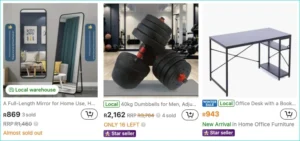Chinese e-commerce Temu has opened its first local warehouse in South Africa, enabling faster delivery times for shoppers. Products marked as local on the platform can now be delivered within two days, with some eligible for next-day delivery.
Temu, known for its heavily discounted goods shipped directly from China, has not disclosed which courier services will handle local deliveries. Currently, non-local orders are imported via Buffalo Logistics and delivered by Fastway.
The move marks Temu’s first major expansion into domestic warehousing since its global launch 18 months ago. The platform entered South Africa in January 2024, quickly gaining popularity due to aggressive pricing and massive online marketing campaigns.
By Gamuchirai Mapako

A 2023 MediaRadar report revealed that Temu increased its advertising budget by 1,000%, with much of it spent on social media promotions. One of its most successful strategies has been gamification, such as a virtual spinning wheel offering first-time buyers steep discounts.
However, Goldman Sachs estimated that Temu’s heavy marketing spending resulted in a $7 loss per order.
Shortly after Temu and rival Shein entered the South African market, local retailers and manufacturers raised concerns over tax loopholes allowing foreign sellers to undercut domestic businesses.

A key issue was a 2007 South African Revenue Service (SARS) concession that let importers pay a flat 20% duty (excluding VAT) on shipments under R500. Retailers argued this allowed foreign sellers to avoid the standard 45% clothing import duty, creating an unfair advantage.
Local tech sellers accused Temu of allowing merchants to sell electronics without proper safety certifications.
Following industry complaints, SARS initially planned to impose the full 45% duty on all clothing imports from July 2024 but later postponed the change. Instead, from September 2024, it added 15% VAT to low-value imports alongside the 20% duty.
Garry Marshall, chair of the South African Express Parcel Association, noted that while Chinese retailers weren’t breaking any laws, the tax structure harmed local textile industries. He warned that scrapping the concession entirely could disrupt import processes, as the system was designed to speed up deliveries rather than reduce costs.













Comments